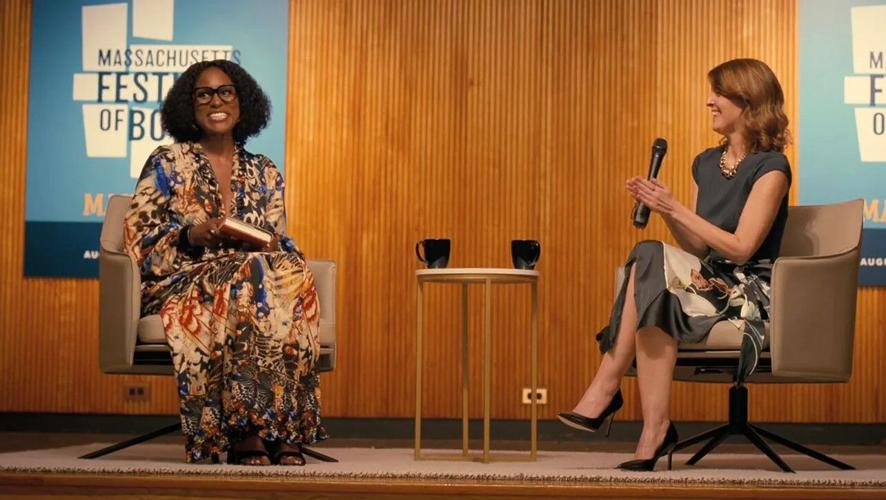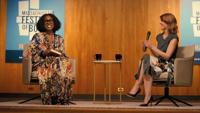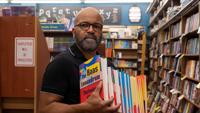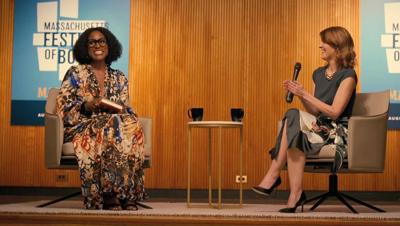It's ironic that Tracee Ellis Ross is in this film because as I watched, I was reminded of another project to which she's connected. Ross was in the ABC series Black-ish (2014), created by Kenya Barris. Barris recently produced the Netflix series, BlackAF (2020), which had an episode where Barris talks about critiquing artwork by African Americans, specifically TV and film work. That episode featured Tyler Perry, the prolific, Black media mogul who basically argued his work was for under-served Black people as his target audience. Some criticized the quality or the stereotypical tropes in Perry's work, but he claimed to be reflecting his audience and many of his fans confirm his work's authenticity. Perry is even referenced in this film and there is a Tyler Perry-equivalent in this film named Sintara Golden, played by Issa Rae (Barbie and Insecure).
Films like Robert Townsend's Hollywood Shuffle (1987) and Spike Lee's Bamboozled (2000) were comparisons that came to mind here. However, Townsend's film wasn't critiquing artwork by Black people. He was critiquing artwork that had Black people in it. There's a difference. One has Black people as the creators. The other has Black people only as the talent, meaning Black people don't have any power or creative control in the actual production. Townsend's film recognizes how Black people as only the talent have to succumb to stereotypical tropes that are offensive or demeaning because they are on the bottom and have to be whatever White people see them as. Lee's film tried to subvert that idea by having a Black person in creative control but still succumbing to those tropes. Lee was in fact critiquing what Tyler Perry would become before Perry would even produce his first feature film that put him on the map.

This film is closer to Lee's Bamboozled in that regard. Writer-director Cord Jefferson, adapting the 2001 novel Erasure by Percival Everett, isn't making an over-the-top satire like Bamboozled. Yes, his film is a satire of sorts, a more subtle one. It's arguably a more dramatic version of Bamboozled, or it incorporates dramatic elements, but Jefferson still has jokes aplenty to keep any audience fairly amused. Most of those jokes are about the racism of White people who are engaging in diversity tokenism, faux allyship, cultural appropriation or what could be considered racist consumerism. Another difference is that Bamboozled took aim at the Tyler Perry-equivalent in that film who was arguably the protagonist. Here, Jefferson's film at first seems to aim at the Tyler Perry-equivalent but rather backs off it.
Jeffrey Wright (The Batman and Casino Royale) stars as Thelonious Ellison aka "Monk," a college professor and published author who lives in Los Angeles. He gets into trouble at his job because he can be seemingly provocative in his classes or courses. It's been a long time since he's published a book. His books tend to be about Black people but narratives that don't involve stereotypical tropes like slavery, ghetto life, poverty, crime, drug-related activity, rap music or what's known as Ebonics. Monk notices though that books, which incorporate those tropes, sell more copies and are more popular. He also notices that it's mostly White people who buy these kinds of books or it's mostly White people who enjoy it. Monk is essentially the Spike Lee-equivalent in this film.

As a joke, Monk decides to write a book called "My Pafology" with all those stereotypical, African American tropes. He's shocked when that book becomes a bestseller sought out by Hollywood. Monk doesn't want people to know he wrote the book, so his literary agent invents a fake persona that a former convict wrote the book, but it involves Monk having to pretend to be this persona at times. Monk essentially has to code-switch or basically do the same thing that Townsend did in Hollywood Shuffle.
Monk's predicament is as much a satire of Hollywood as it is a satire of the book industry. The Hulu series The Other Black Girl (2023) also touches upon the same critiques of the book industry that this film does, so there's apparent truth in the critiques. Radha Blank's The 40-Year-Old Version (2020) similarly touched upon the same kind of critiques but aimed at the Broadway industry. The point is made that Black stereotypes and tropes sell better than the non-tropes, but the non-tropes are just as representative of the Black community, if not more so.

Monk's James Frey-like misadventure is counterbalanced with a more dramatic narrative where Monk is dealing with his mother's medical care. Monk's mother is diagnosed with Alzheimer's disease. There are some poignant moments where we see the effects or ramifications that the mother's illness has on Monk and his siblings. It forces Monk to deal with his family whom he hasn't had much contact. His family lives in Boston, whereas he's in L.A., and apparently Monk has made no efforts to call or communicate with them over that long distance.
His mother's illness is more of an excuse that propels Monk into the "My Pafology" story line. It shows that Black people deal with more than just the stereotypical tropes. It shows that Black people deal with things that many others do like certain medical illnesses. Black people are not all gun violence and baby mamas. As Monk says, it's not as if those stereotypical things aren't true. It's simply that Black people are more than that.

That being said, Jefferson's film satirizes Black stereotypes. Yet, when it comes to gay stereotypes, he instead leans into them. Sterling K. Brown (This Is Us and The People v. O. J. Simpson) plays Cliff, the brother to Monk. Cliff is a plastic surgeon who lives in Tucson, Arizona. He's recently divorced because his wife caught him having sex with a man. His gay life then consists of hooking up with boys half his age and doing a lot of party drugs or harder ones, which is very much a gay stereotype. However, Brown's performance is so charming and his numerous shirtless scenes would surely appease any gay critics. Yet, more fleshing out of his character would've helped to counterbalance his stereotypical persona.
Rated R for language, some drug use, sexual references and brief violence.
Running Time: 1 hr. and 57 mins.
In theaters.











